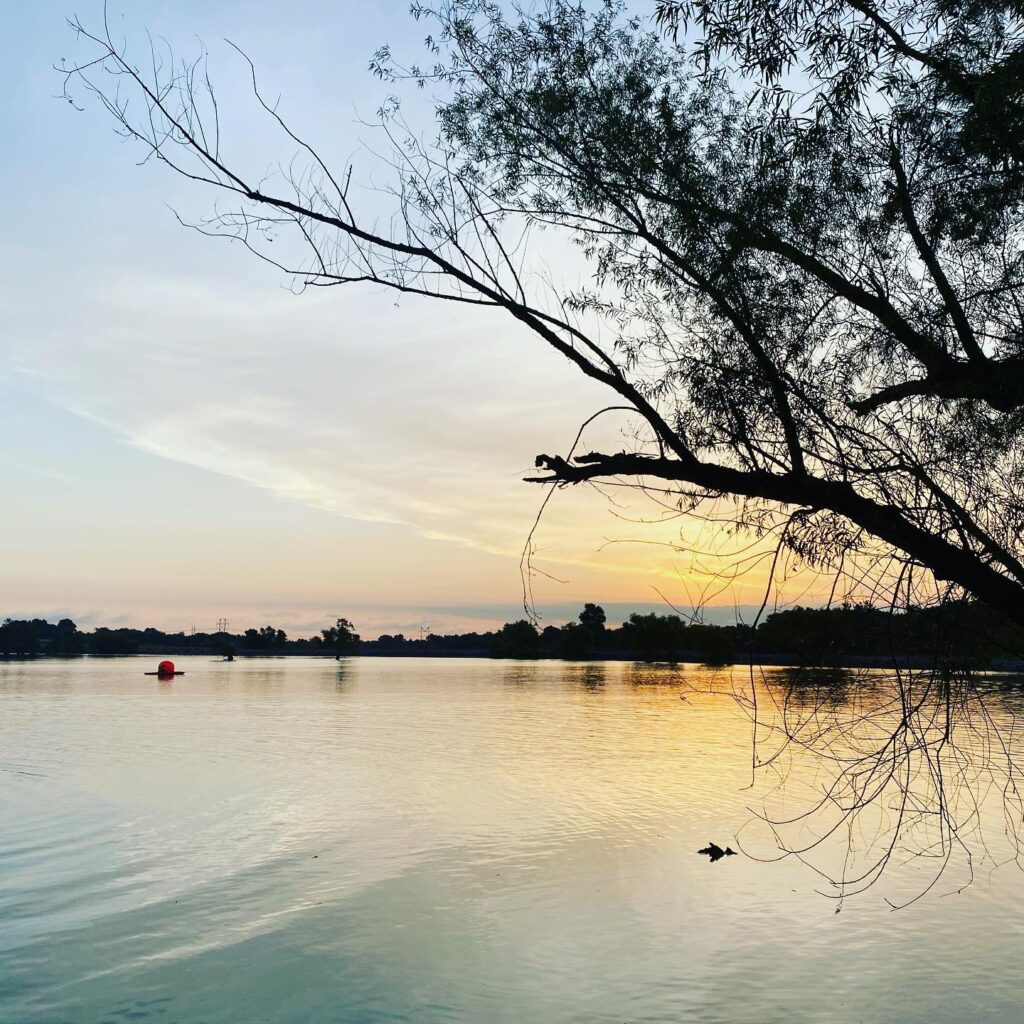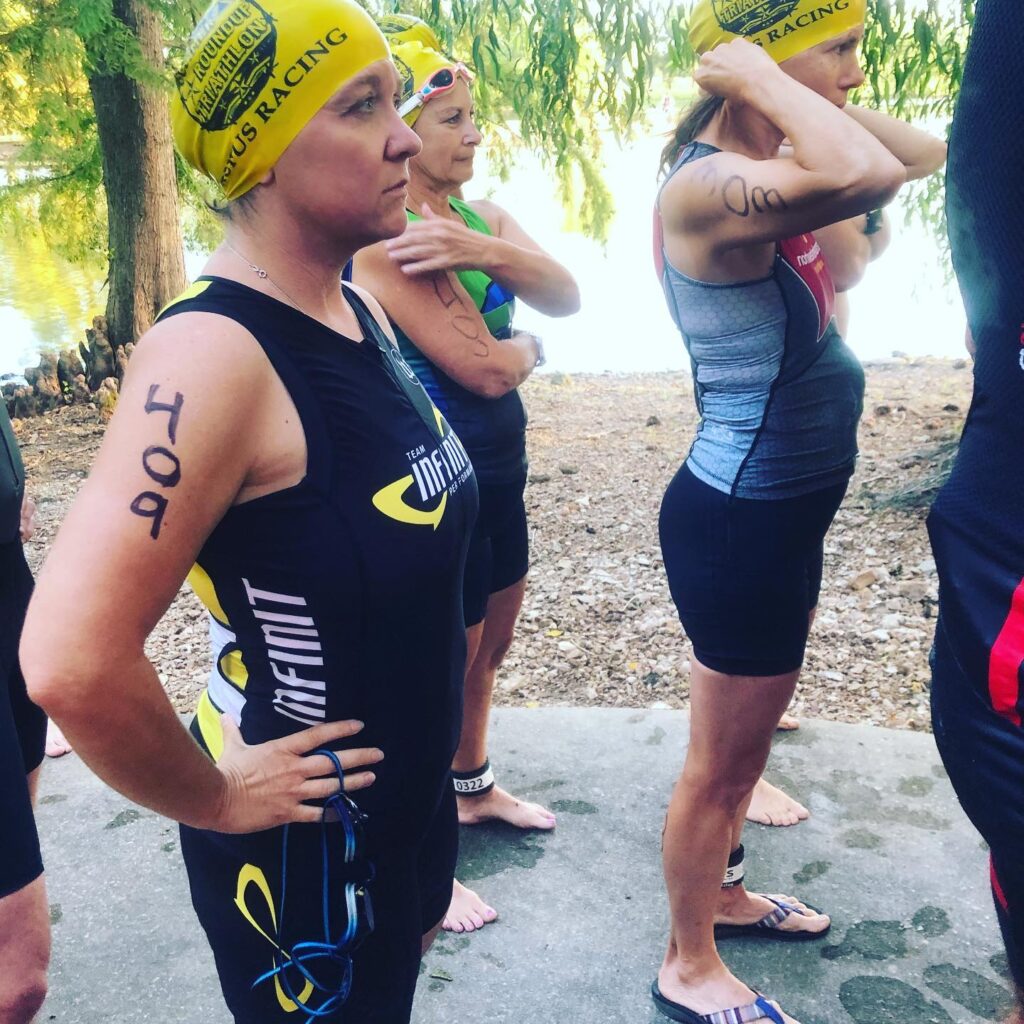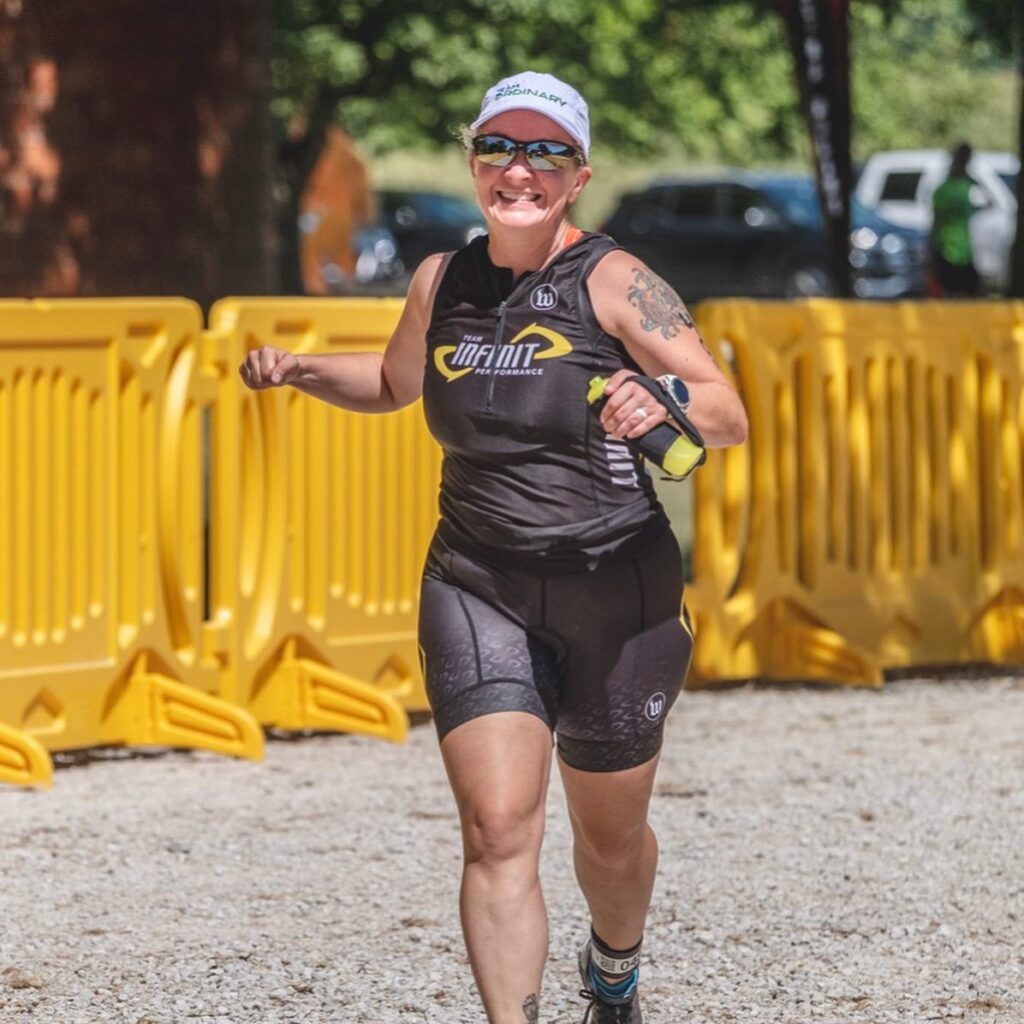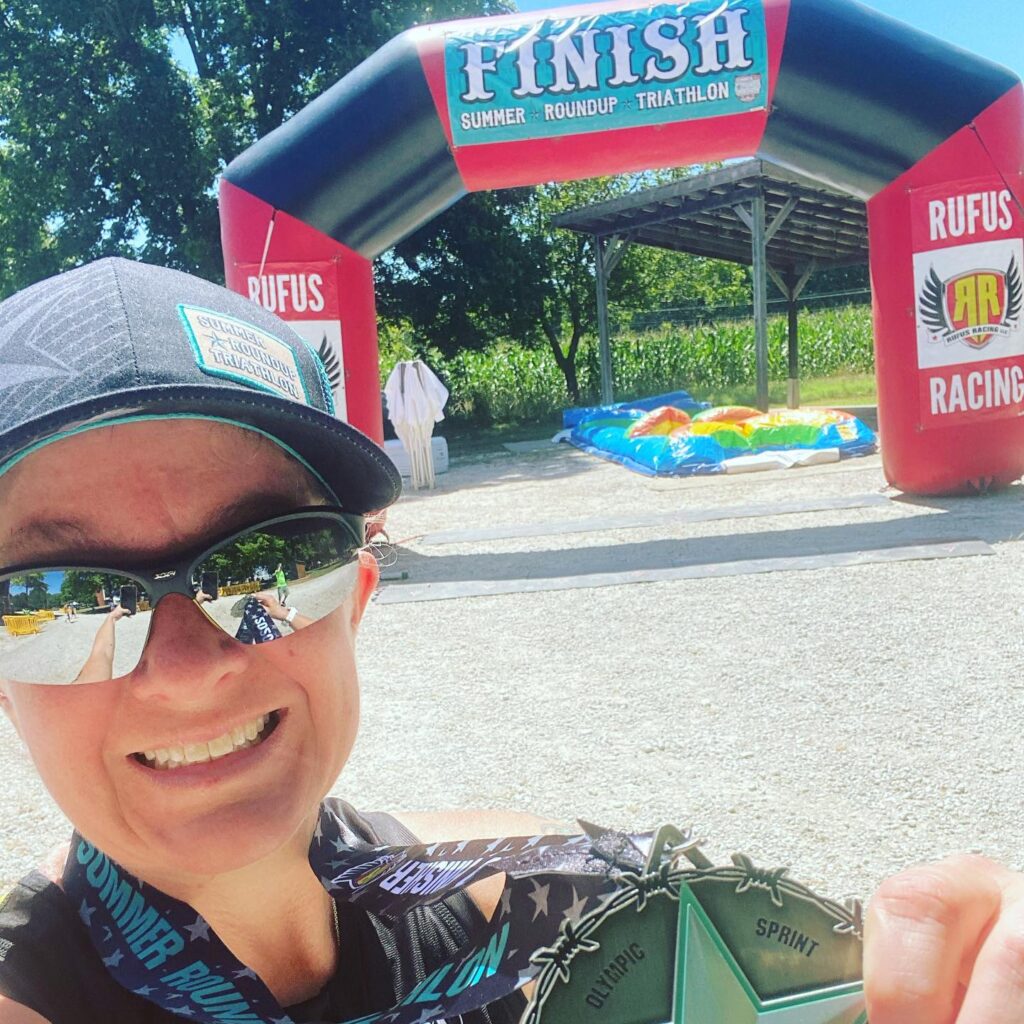Erin Shepherd is a Team Ordinary Athlete coached by Scott Riecke. She has overcome a lot of obstacles and challenges, but lets nothing stand in her way. She's a persistent and disciplined hard-worker, and as you'll see here... doesn't give up easily.
GRIT. /grit/ noun 2. courage and resolve; strength of character.
On July 12, 2020, I raced the Summer Roundup Triathlon put on by Rufus Racing. It was held on a small, private farm and lake in nearby Joplin, Missouri. As it’s a summer race in the midwest, it’s known for being flat, fast, and hot! True to the reputation, the race was certainly all of these things.
There were questions surrounding the race and whether it should be held due to COVID. Ruth Sawkins, the RD, did an amazing job of making everyone feel safe and comfortable in the surroundings. Masks were requested, health checks carried out and plans put in place. The race is small and local, and she capped the numbers in order to give everyone ample space in transition and in lining up for the swim. I felt comfortable racing, and was ready to go. I felt that under Coach Scott, I was well-prepared and well-trained for my first Olympic triathlon race.

Swim: The swim. Wow. The small lake was absolutely beautiful in the sunrise. It was calm, nearly glasslike at its surface. I looked out at the buoys and thought how far away they looked. Of course, they weren’t as far out as my head imagined them to be. Due to COVID and the fact that so many people hadn’t ample time to train for a swim, the swim was shortened to 1000 meters, and was done in two 500 meter loops. This was so that the RD could put her eyes on each swimmer as they exited and entered the water to ensure safety.
I lined up with the 2:15/2:20 pace groups, and we stood in line for a little while. I started out feeling okay, joking around and soaking up the race energy. As the time moved on, and it was time for me to take out my hearing aids, I felt my anxiety ramp up. My heart started racing and I had to tell myself to calm down. I got to the water, and was told to go, and I put in maybe 3 or 4 strokes before calling for the kayak. Kayak came over and I said “I’m deaf, but I can talk, and I’m panicking”. I asked him to stay close and tried another couple strokes, but my heart rate wouldn’t allow me to catch a breath. I grabbed the kayak again and assessed my options.

I knew Ruth is a believer in beginners, and is one of the most accommodating race directors I’ve ever met. She does a “safety wave”, where triathletes can use their swim safety buoys as an extra layer of safety and confidence. I was close enough to shore to yell to Ruth, who understood what was happening. She got Jake, my husband, and was able to toss me my safety buoy. I strapped it around my waist and was able to start moving. It still took me time to calm down and a lot of self-talk to push through the panic, but I did it. I swam the first lap, got out and pushed on for the second lap.
When I exited the water after my second lap, it was clear….I was the last one out. The panic attack stole the time.

Bike: I ran into transition, and was able to get into my gear for the bike. I spent an extra minute ensuring I had what was necessary, and took off to the mount line. I realized as I hopped on, that I didn’t grab any of my nutrition and knew that my race plan was shot. I was basically going to have to wing it at this point. The bike course was 12.2 miles – two loops totaling 24.4 miles for the Olympic. I set out hot, and told myself to back off a little, and save because I knew the backside was a little bit of a false flat and I needed to reserve energy for loop 2.
What was truly amazing about this bike is that I felt extremely confident. This was a new development, and I ate it up. On some portions of the course, I glanced at my watch to see I was riding at 18-19mph. My normal average is 13, and I was excited by how it felt. I kept that momentum up, although I slowed on the false flats. I predicted that would happen, and was not deterred. I was hungry after my first lap, and quickly understood the bad idea of going off race plan. There was nothing I could do at that point, so I flew into my second lap and decided to push hard. My overall average ended up being 15.2, and that’s almost unheard of for me. I was grateful for a good bike, or I may have quit the race then. Into transition, which at this point was a ghost town since everyone else was either finished or still on the run.

Run: This is the quickest transition for me, and was pretty easy. I had pre-loaded my liquid nutrition, Infinit Run Blend, into my water bottle. At least I’d have a small amount of calories and electrolytes, though I was aware it wasn’t going to be enough. The plan for the race was to run the first mile, no matter how slowly. But once I was on the course, going up a small hill with the sun bearing down, I knew that wasn’t going to work. I trashed my legs on the bike and since I didn’t take in calories while biking, I hit the wall early on. I started out and saw several friends/teammates who were in the last lap of their run and they were very encouraging! I made it to the aid station for the first lap, and was able to get some ice down my kit and legs sprayed with a super soaker to cool off.
Back down the course and back up for the second lap. By the time I got halfway through the second lap, I was the only human left on the road. I made it to the aid station and laughed, declaring I was the last. A couple volunteers asked how I knew I was last, and I made a sweeping motion. It’s just me!! At that point, I was basically running for a minute, and walking for 45 seconds. I tried to keep the walk under 45 seconds and run when I could. The run portion definitely goes down as my slowest 10K! A kind volunteer did the run/walk with me for the last mile and a half, and called the finish line to make sure everything was still up. We chatted, we ran, we walked and I was able to get to the finish. 3 hours and 50 minutes later, I had finished my first Olympic triathlon.
So, why did I give the definition of grit at the beginning? I’m not particularly brave or courageous. I don’t like to be considered “inspirational” because I’m a deaf athlete. Instead, I use grit to explain why I was able to finish this race. I could have taken the DNF at the swim. I considered it. I asked for help. I assessed my options and asked for help so I can complete this race and check off this goal. Now, am I aware that IRONMAN isn’t going to give me the same considerations as this race? Of course I’m aware. But let’s consider what I’ve also come to understand. I am a strong athlete, but I have vision and hearing disabilities that limit my balance on the bike. That means I need to continue researching a bike guide for my safety and the safety of those around me. I’m a strong runner, but I will push myself to injury and sometimes, even quit. That means I need to listen to my qualified coach and make sure I’m following best practices. Finally, I have clinical anxiety and ADHD. This means I need to practice my coping tools, and do the things that scare me, even if I have to ask for help.
Grit isn’t always pushing and pushing and running more and being the best. Sometimes, grit is the fight for each tiny step, for the call for help, and for finishing what you’ve started, even if it means coming in dead effin’ last.


Erin:
Way to hang in there and make it past the panic to the finish line. I’ve been doing triathlons for more than 10 years and panic in open water still occasionally ambushes me. You are truly an inspirational athlete. Recommending a book that has helped me on and off the race course: Triathlete Eq: A Guide for Emotional Endurance.
Thank you for the recommendation! I need a new book!!!
Great Job!!!!!! Sounds a lot like my first Olympic. The things I learned that day about myself still help to push me forward. Keep pushing!!!